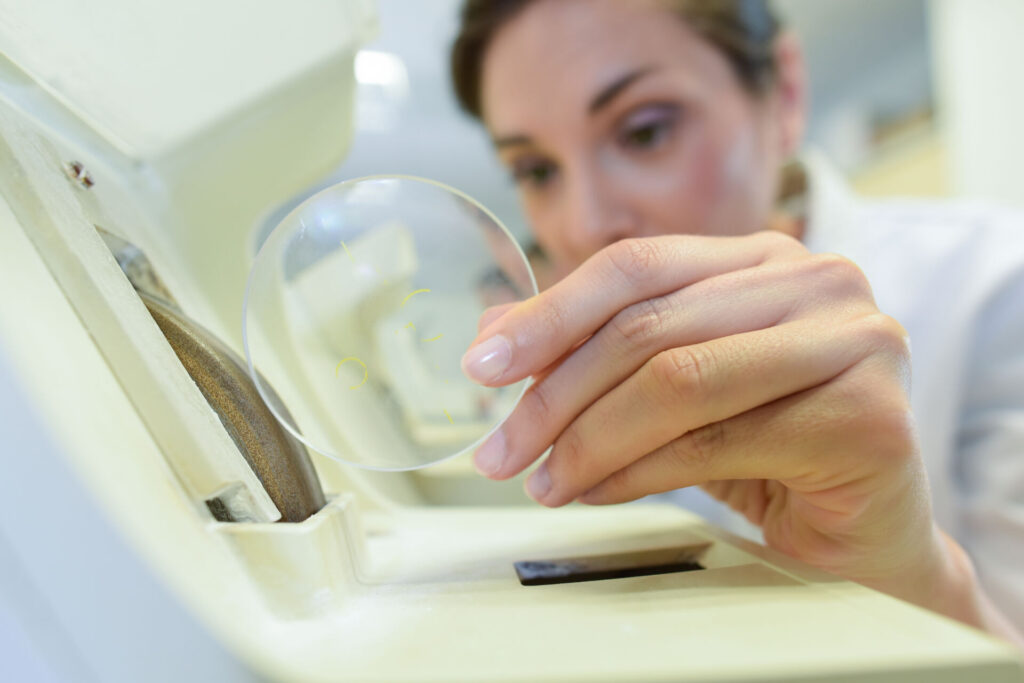Eye care can be a little… confusing. In the course of maintaining good eyesight, many people will rely on three completely separate types of eye care professional, all with names that sound vaguely similar, thanks to the repeated use of the prefix “op-“ (from the Greek word “ophthalmos,” meaning “eye”).
When you need eyeglasses, do you go to an optometrist or an ophthalmologist? Can an optician prescribe contacts? What type of specialist does eye surgery?
This month, we’re taking a closer look at the three most common eye care specialists and look at the differences between their practices. By the end of this article, you’ll be able to determine who you need to see for your eye care: an optician vs. optometrist vs. ophthalmologist.
An Optometrist Is Where Your Eye Care Journey Starts
When most people think of an “eye doctor,” they’re thinking of an optometrist. An optometrist is usually the first stop for someone looking to improve or maintain their vision.
Optometrists are medical doctors who have have a degree in and have performed a residency in optometry. They specialize in primary eye care:
- Performing regular eye exams that check the general health of the patient’s eyes and use special equipment to determine if there is any refractive error that could require corrective lenses.
- Performing refractive checks and writing prescriptions for corrective lenses.
- Performing comprehensive eye exams that either address a new or recurring concern about the patient’s vision or identify and diagnose emerging conditions that can affect the patient’s eye health.
- Performing basic procedures and prescribing medications to address certain eye conditions that don’t require surgery or other invasive procedures.
Optometrists diagnose and help manage conditions including:
- Refractive error
- Eye tumors/cancer
- Diabetic retinopathy
- Macular degeneration
- Cataracts
- Glaucoma
- Strabismus
- Amblyopia
- Corneal disease
- Dry eye syndrome
- And others
An optometrist relies on a number of tools to provide eye care, including:
- A tonometer to determine intraocular pressure, a standard test for glaucoma
- Phoropters and refractors to help identify refractive errors
- Retinal cameras and slit lamps to directly view the retina
While optometrists cannot perform invasive surgeries, they are licensed to remove foreign objects from the eye and to order blood tests and diagnostic imaging (x-rays, CT scans, and MRIs). They can also prescribe all types of eyedrops and most types of oral medications, including painkillers.
Ophthalmologists Treat Serious Eye Conditions

When an eye condition requires more intensive treatment than an optometrist can provide or surgery is needed, an ophthalmologist is the professional to turn to. Instead of focusing on general eye care, an ophthalmologist specializes in treating medical conditions related to the eye.
During their education, an ophthalmologist undergoes a special residency program that focuses on optical health. In most cases, this program also contains a special integrated program in which the rising ophthalmologists spend a year studying topics from other medical specialties in order to gain a more holistic understanding of how other medical conditions can affect the eye and vice versa.
Ophthalmologists can perform surgery on the eyes and surrounding parts of the body. They can also perform minimally invasive laser procedures such as LASEK and PRK.
Some of the conditions that will commonly require an ophthalmologist for treatment include:
- Cataracts
- Thyroid eye disease
- Disorders of the tear ducts
- Ptosis
- Retinal detachment
- Endophthalmitis
- Uveitis
- Ocular trauma, including ruptured globe injuries
- Orbital fractures (fractures of the bones in the eye socket)
Opticians Make Corrective Lenses

If you have a refractive error and choose not to undergo corrective surgery, an optician is the professional you’ll turn to for your eyeglasses or contact lenses. Of the three specialties, an optician is the only one not required to have a medical degree since they do not perform any diagnostic or therapeutic services.
Instead, the optician’s job is to take an optical prescription from an optometrist or ophthalmologist and fit the patient with an accurate pair of corrective lenses. They use precision equipment to make lenses that precisely correct the patient’s vision, whether the error is nearsightedness, farsightedness, astigmatism, presbyopia, or another vision problem.
If the patient elects eyeglasses for vision correction, the optician will use tools to measure the patient’s eyes and face to ensure that the lenses will be accurately placed to provide the required correction without causing discomfort for the patient. They’ll recommend particular types of lenses, such as safety lenses or polarized sunglasses, depending on the patient’s lifestyle, working conditions, and preferences.
If the patient prefers contact lenses, the optician will review the different options and help the patient select the right kind of lenses. They’ll help educate the patient on taking care of their contacts and provide the various cleaners and other products required to maintain contact lenses. If the patient chooses disposable contacts, the optician will set up a schedule to produce and provide replacement lenses according to the manufacturer’s recommendations.
Choose a Complete Eye Care Center With All Three
When it comes to your eye health, convenience and experience matter. By choosing a full-service complete eye care center like Eyesight Associates, you can rest assured that all three types of eye care professionals are on hand to provide you with any optical or medical services you need, all under one roof.
Let Eyesight Associates Be Your Complete Eye Care Center!
From essential and comprehensive eye exams to surgical procedures, including LASEK and PRK, Eyesight Associates is Middle Georgia’s and Coastal Georgia’s choice for optical health. With eight locations around the midstate and the Golden Isles, we’re always close at hand to help you maintain clear vision! Call to learn more or make an appointment: 478-923-5872.
Related Articles:
- 3 Reasons You Should Wear Polarized Sunglasses This Summer
- Celebrate World Sight Day With These Simple Tips
